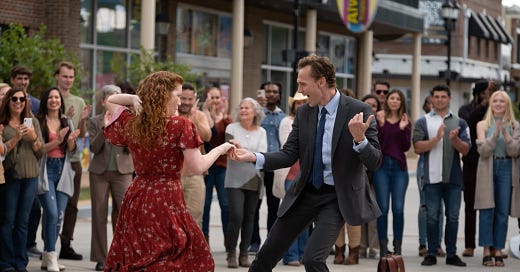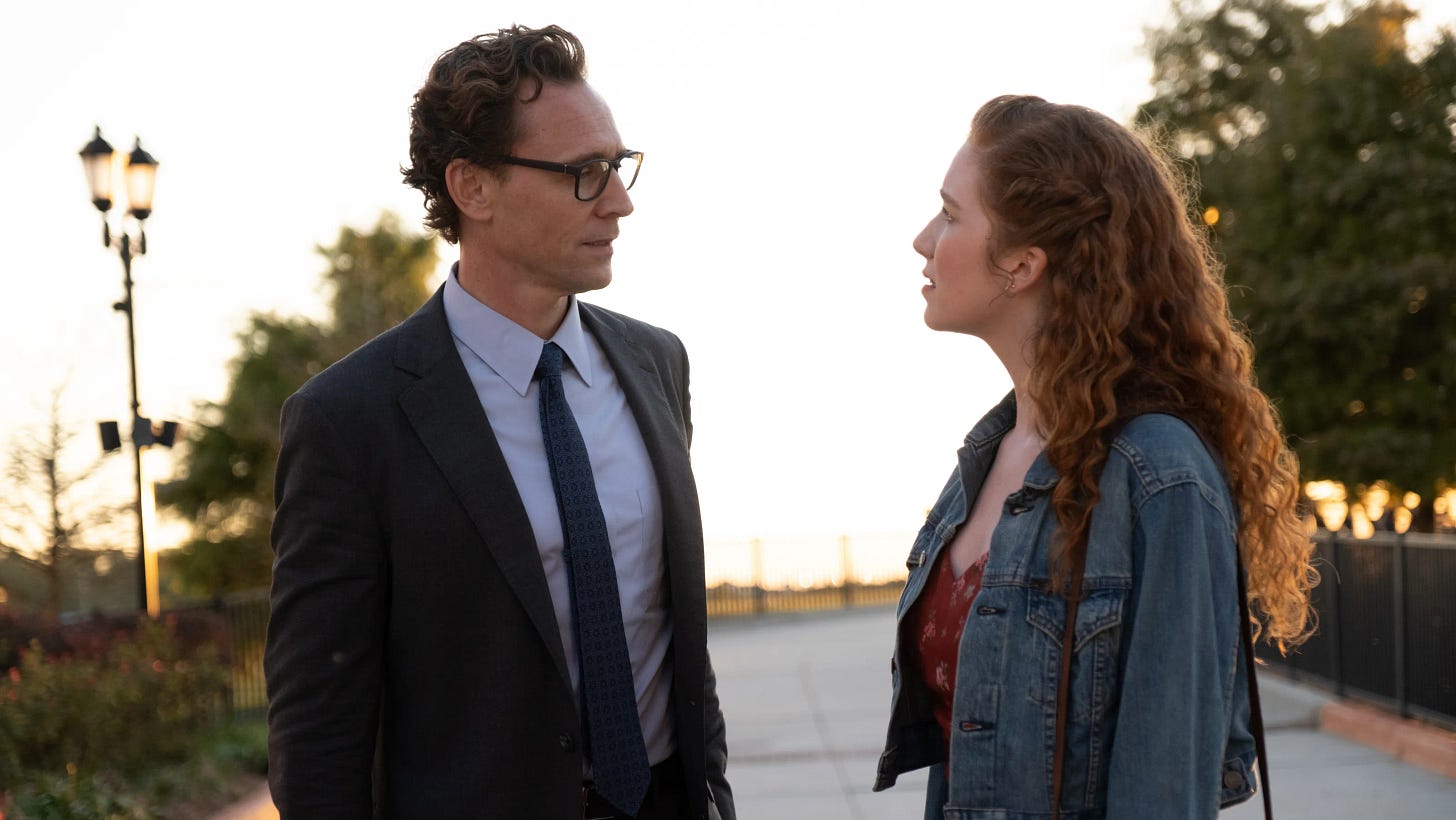They don’t make movies like they used to. It’s a common phrase uttered by the American populace that The Life of Chuck aims to resolve. Adapted from several Stephen King short stories from his compilation book If It Bleeds, published in 2020, horror director Mike Flanagan takes another crack at the Stephen King universe. Flanagan moves away from horror to ponder the meaning of life and what makes “any of this” worth it. Most films today shy away from sentimentality, unlike the earnest crowd-pleasers of the ’80s and ’90s. With that quintessentially American approach missing from modern cinema. Flanagan’s attempt to bring it back clearly resonated as The Life of Chuck won the coveted People’s Choice Award at this past year’s TIFF Festival, a frequent precursor to Oscar success. But distributor Neon curiously pushed the film out to June. Which begs the question. Was The Life of Chuck truly worthy of winning the hearts of TIFF? Or did Neon have a reason to push this to June?
What’s it all about?
The Life of Chuck is structured in three acts told in reverse chronological order, beginning with high school teacher Marty Anderson (Chiwetel Ejiofor). Set in the near future, as Charles “Chuck” Krantz (Tom Hiddleston) is on his deathbed, he observes bizarre events signifying the end of the world—natural disasters, blackouts, and cryptic signs honoring Charles. As Marty reconnects with his ex-wife Felicia during the strange phenomenon, the narrative rewinds to uncover what Chuck meant to the world. And what the world means to him. In the middle chapter, we meet Chuck nine months earlier during a business trip in Boston, where a chance encounter with a street drummer and a heartbroken young woman named Janice (Annalisse Basso) reignites a sense of joy and spontaneity he can’t explain. Then, the first act takes us back to Chuck’s childhood, where he is raised by his alcoholic grandfather Albie (Mark Hamill) and free-spirited grandmother Sarah (Mia Sara) after both his parents die in a car crash. In school, he finds inspiration in poetry, dance, and a compassionate teacher named Ms. Richards, shaping a worldview that is both grounded and strangely transcendent. As the film moves backward through the chapters of Chuck’s life, it gradually reveals how one seemingly ordinary man became the center of a world.
A Mostly White Piece of Bread
I’m not at all familiar with Mike Flanagan’s work, but he’s got a small fanbase brewing who love his work. The Life of Chuck, though, at least on the surface, is a pretty major departure for him. While the film’s poster shows Tom Hiddleston dancing through the Milky Way, the film is stylistically bland. Despite taking creative choices with the film’s narratives, Flanagan keeps the film’s visual language very safe and accessible. A solid piece of invisible filmmaking. I’m unsurprised to learn that cinematographer Eben Bolter has spent most of his career shooting television because it shows. While I appreciate the effort not to overload the senses, which filmmakers with less confidence like to do nowadays, big chunks of the film look like a Progressive commercial. I’ve been on short film sets with .02 percent of the film’s budget, with results not too dissimilar. Still, some of Flanagan’s flair shows up especially in the film’s 3rd act (1st act of the movie), as the world is crumbling and despair looms at every corner. Still, this section of the film boasts a mostly “commercial-like” look with several scenes set inside Marty’s house. But once the rapture reaches an apex and he’s roaming the empty streets to find his ex-wife, Flanagan strikes a dreary atmosphere with the haunting image of Krantz’s face appearing as holograms in every house on the block. And, through eerie editing and unsettling sound design, Flanagan evokes a chilling sense of finality. But despite some neat, creative, and stylistic flourishes, along with a wonderful dance sequence in the middle of the film, Flanagan tries to cram down the message of “enjoy every moment” a little too hard.
Everything is Deep (pause)
What really makes The Life of Chuck so difficult to get invested in is that once we enter the title character’s world, everyone around him delivers lines as if the director told them that this will make a “really big moment”. Thus, nobody feels like a real human being. Instead, they are these all-knowing creatures with conveniently placed nuggets of wisdom that will eventually conjure up a profound reckoning for Chuck. Perhaps in a children’s film, this tonal simplicity would suffice, but in a relatively adult drama, it grows old. The aspiration for profundity is borderline embarrassing, as passages from Whitman are supposed to move the world. The film’s not mean-spirited or lazy in its quest to inspire the audience or reflect on “what’s truly important”; it’s just too cheesy. When you try to balance poignancy with accessibility, you get neither. The film loses sight of what the story’s really about: human beings. Everybody is rendered into a talking piece, not a fleshed-out being with flaws, ambitions, and doubt. When you can’t come away with one truly authentic moment in a sea of ones crying out to be, that’s a problem. Thus, the film is forced to resort to schmaltz and ‘happy’ moments to land its message home. So, it’s safe to say the comparisons to Capra are just another sign of the declining quality of film criticism.
Where’s the Cynical Touch?
Beyond the forced profundity, every character is far too nice. This is a picture that simply does not have the stomach to be cynical. The film understands that cynicism is easy to succumb to, especially with all the horribleness surrounding us, but it cannot properly express it. There’s nothing to counteract the “beauty” of life and community that the film so desperately wants to cram down our throats. The Capra comparisons, while lazy, are certainly founded. If anything, Flanagan wants to recreate the magic of those films, but what made those screenplays so effective was not only the optimistic hero’s resolve but the odds he was going against. The fight itself. It’s the force that brings the characters to the brink. You need the Mr. Potter from It’s a Wonderful Life, or the Jim Taylors of Mr. Smith Goes to Washington. They are the ones who represent all the greed, corruption, and pessimism of the world. So when Jimmy Stewart stares up at the President of the Senate at the end of Mr. Smith Goes to Washington after all the hell he’s put through, the shimmer of hope shows in the smiles they exchange. What The Life of Chuck misses is a strong antagonistic force to bring out the beauty in life’s struggle. While the constant tragedy in Chuck’s adolescent life (the loss of every immediate family member) can be argued to be the antagonistic force, it’s not driven by him. It just happens. What’s worse is that these moments are processed with such immense maturity, which is remarkable for anybody at any age, but especially for a child. How he reacts to life’s pitfalls and tragedies is never effectively revealed. Not enough Yin with my Yang.
At least it’s got some spirit
What’s undeniable is that The Life of Chuck has a strong spirit. In an age of irony and emotional detachment, I’ve grown to admire films that at least attempt emotional honesty. I’ve encountered so many films that are afraid to feel something or intentionally avoid it for the sake of art, so The Life of Chuck is a nice change of pace. That’s not enough, though. Unfortunately, Flanagan’s film leans a little too far into sentimentality, chasing profundity without anchoring it in recognizable humanity. The result is a movie that’s far more respectable than impactful, but ultimately trying too hard to say something important. Still, in a landscape flooded with soulless blockbusters and self-serious art-house exercises, there’s something to be said for a film that at least wears its heart on its sleeve. Too bad.









You really pinpoint one of the issues I had with the movie. The writing is just a little too in your face sentimental at times. I can ultimately forgive it, but I’d be reluctant to call the movie perfect. I think Midnight Mass struck a better balance. Definitely a show worth checking out if you’re not yet familiar with Flanagan. Haunting on Hill House was also borderline perfect in my eyes.
The R rating hurt this film immensely, along with its placement in June. Neon only acquired it in September of 2024 almost a year AFTER it premiered at TIFF, I'd guess that most studios saw it as a hard sell even with the Audience Award. Also, as nice as the guy appears to be and as good of an actor as he is, Tom Hiddleston is not a movie star.